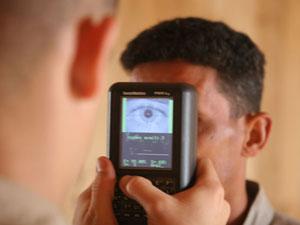CSI Iraq: Biometric crime fighting or hit list?
This story was originally reported by PRI’s The World. For more, listen to the audio above.
When a roadside bomb goes off outside of Baghdad, investigators may look for fingerprints. If they find one, they may be able to check it against an enormous database of biometric information that the United States started collecting after the invasion of Iraq in 2003.
“If you can identify who it is that built the roadside bomb, that’s a tremendous advantage,” Jim Lewis, director of the Technology and Public Policy Program at the Center for Strategic and International Studies, told PRI’s The World. The organization helped the Pentagon research the use of biometric data in counterterrorism. He explained:
It doesn’t always work, and sometimes there’s a little bit of luck involved. But it’s a way to figure out who are the guys that make the suicide vests, who are the guys that are making the roadside bombs. And getting them to stop doing what they’re doing is really a big help.
The pentagon now has biometric information about nearly 7 percent of Iraq’s 29 million people, according to the Boston Globe, including “their names, facial scans, and often other details about them, such as whether they were considered a friend or foe.”
“It was very helpful in the war,” said Lewis told the Boston Globe. “Now that the war is over, the question is: What do you do with it?”
Now that US combat troops are pulling out of Iraq, some experts have raised concerns about turning the information over to the Iraqi government. “There’s a fear that if sectarian tensions really bubble over, that biometric database could become a kind of hit list,” according to Noah Schachtman, a former Iraq war reporter and fellow at the Brookings Institution. He says:
Because it matches faces to names, and because names respond to tribes and religious affiliations, that biometric database could prove to be something really bad. A sort of way to target enemies.
Some have also raised concerns about the Iraqi government’s ability to properly manage the information. Naseer Nouri, who worked as a correspondent for the Washington Post in Baghdad during the US occupation, told The World:
Everyone knows that the Iraqi police, or Iraqi military or the Iraqi government are infiltrated by people who work for those insurgents or the militias. That information will be very helpful for them to chase those people who worked for US military or their families. I believe it will be like kind of revenge attacks.
Troops are collecting similar biometric information in Afghanistan. The Pentagon has collected some 4 million records worldwide, and forty percent of them, for now, are Iraqi. No matter who owns this information in the future, it’s bound to create some sticky legal issues. Lewis asks:
Can the Army share with the domestic police? Can they share with another country? If they share it, what uses can it to be put to? Can it be used for terrorism, or can it be used for parking fines? How does it get introduced into a court? What authorities do you collect it under? How long can you store it? So, sharing, storage, use, we’re going to need to refine the rules for them.
You can watch a video about US troops collecting biometric information below:
PRI’s “The World” is a one-hour, weekday radio news magazine offering a mix of news, features, interviews, and music from around the globe. “The World” is a co-production of the BBC World Service, PRI and WGBH Boston. More “The World.”
